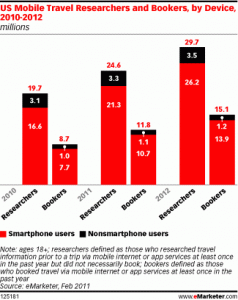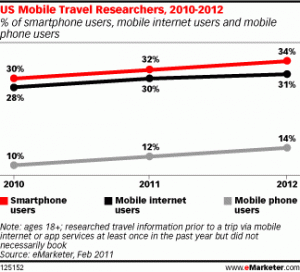Mobile Travel Planners Offer Marketers Growing Target
 Smart device apps and mobile-optimized websites are changing the way people travel, from trip planning to boarding an airplane to how they experience destinations. This means new and richer opportunities for marketers to connect with consumers before, during and after their trips.
Smart device apps and mobile-optimized websites are changing the way people travel, from trip planning to boarding an airplane to how they experience destinations. This means new and richer opportunities for marketers to connect with consumers before, during and after their trips.
eMarketer estimates that nearly 25 million US mobile users will research travel information on their mobile devices before making a trip this year. Nearly 12 million will use the mobile channel to book their plans. The vast majority of both groups will be made up of smartphone users.
“Mobile has dramatically altered the travel experience,” said Noah Elkin, eMarketer principal analyst and author of the new report, “Mobile Travel Takes Off: Emerging Trends and Best Practices for Marketers.” “From pre-trip planning to in-flight and on-property services to context- and location-aware destination information, mobile devices promise to transform every phase in the travel process, putting vital information—and new marketing opportunities—within hand’s reach.”
 By next year, 34% of smartphone users and 31% of mobile internet users in the US will research travel via mobile. At the same time, 18% of smartphone users and 16% of mobile internet users will book travel the same way.
By next year, 34% of smartphone users and 31% of mobile internet users in the US will research travel via mobile. At the same time, 18% of smartphone users and 16% of mobile internet users will book travel the same way.
As consumers integrate their mobile devices into their travel plans, marketers that want to keep pace must develop innovative approaches that fit with their audience’s habits and preferences.
“An integrated, comprehensive approach will serve brands best,” said Elkin. “The more flexibly brands can offer to help their customers manage their travel—using a mobile-optimized website, apps and integration between mobile, online and offline channels—the more effective they will be. Mobile travelers, especially those carrying smartphones, are demanding, and expect suppliers to get it right the first time.”
